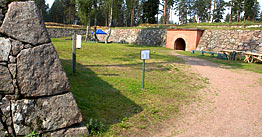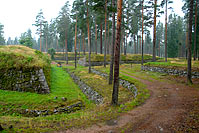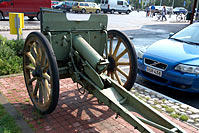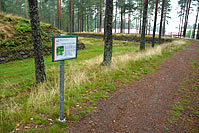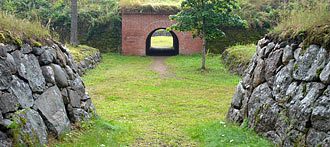History of the Taavetti fortress
Old Russian bastion fortress in the south Finlandia is the issue of this section. It is situated in the important crossroads at the south coast of Saima lake system and defends highways from Vyborg to Mikkeli and from Lappeenranta to Hamina. It was founded in 1773 under empress Katharine II in eve of new war of Russians and Swedes. Russian name of the fortress was David, Davydovskaya fortress, Sweden - Davidstat and Taavetti - in Finnish.
The fortress consists of a circle of the stone-earthen bastions which were connected by low curtains wit dry ditch in front of them. The citadel with five bastions and raveling was constructed at the north part of the fortress. Its escarpments were covered by granite stones. Garrison of regular planning was inside the fortress. Only few native Finnish peasant's families from the Martilla village lived near the fortress.
In 1791-92 general Alexander Suvorov was in charge of commander of Russian troops in Finland. Many improvements have been made in the fortress Taavetti in that time.
Successor of Katherine II emperor Pavel I was not an admirer of the idea of Northern Fortresses. Taavetti was reduced to a lower rank of the fortress as "retrenchment" at first. Then it was removed from the ranks after issuing by Russian czar a manifesto of accession of Finland in 1808. Fortress was abandoned and begun dilapidated. In the midst of 19 AC, most of its bastion were demolished during construction of Luumaki town.
In 1980-th reconstruction of Taavetti's citadel begun. The works sponsored by Ministry of Labour and National Board of Antiquities of Finland. At this time (August 2008) the citadel is near to restored completely and presents splendid pattern of Russian fortification architecture of 18 AC.
There are the electric lighting in the fortress, safe footpaths with plates with guideline instructions and historical background. There is only problem - all inscriptions are in Finnish, so you need to get some skill in this language before visit to the Taavetti fortress (or get the Finnish dictionary in your baggage).
Traditional Luumaki Day is arranged on the second weekend of July every year and a great deal of events and celebrations are happened among old citadel's bastions.
Impressions
It is a very cheerful thing for me as Russian that some peoples in far Northern country decided to renovate old Russian fortress in their country, and they did this splendid job in spite of all enmity and quarrels between us in the old times. So they did it and their beloved Luumaki city got more attractions for the foreign visitors and tourists. Alas, in Russia we have few such shining examples...
Land forts and fortress:
Bip Castle Gatchina Ivangorod Izborsk Kexholm Kirillov Monastery Koporye Novgorod Pechorskiy Monastery Peter&Paul Fortress Porkhov Pskov Schlisselburg Staraya Ladoga Tikhvin Vyborg Hameenlinna Hamina Kastelholm Kymenlinna Lappaenranta Raseborg Castle Savonlinna Tavetti Turku Visby Fredrikstadt Fredriksten Hegra Fort Hoytorp Fort Arensburg Narva Tallinn Antipatris Caesarea Jerusalem Latrun Fort Masada
Sea forts and fortresses:
Alexander Fort Ino Fort Krasnaya Gorka Fort Kronstadt: Kotlin isl. Kronstadt: North Forts Kronstadt: South Forts Trongsund Hanko Svartholm Sveaborg Marstrand Siaro Fort Vaxholm Oscarsborg
Artillery batteries and individual guns:
Coastal Artillery Hemso Fort
Fortified areas and defensive lines:
Karelian Fortified Area (KaUR) KrUR Leningrad Mannerheim Line Nevsky Bridgehead VT Line Harparskog Line Salpa Line Gothland
Russian
S e a r c h All news

